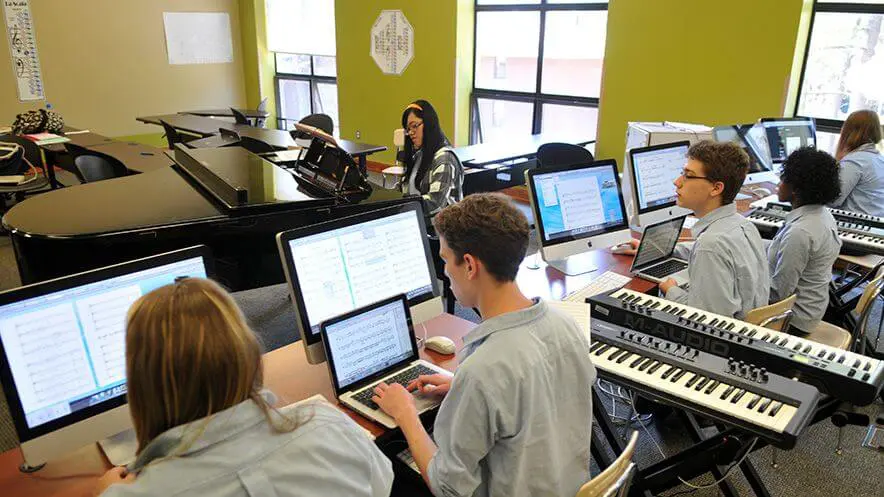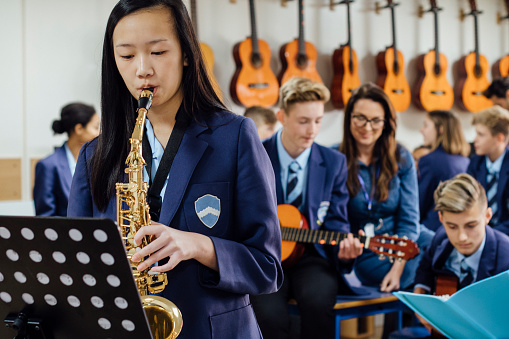Schools in USA
15 Best Trade Schools in Virginia | Costs, Requirements, and How to Apply
This article explores the best trade schools in Virginia.
Training for careers in in-demand industries is offered by Virginia trade schools.
Some of these sectors include healthcare, skilled trades, personal care, and hospitality.
Graduates can work as medical assistants, dental hygienists, mechanics, or electricians.
Vocational program participants complete the required in-class and practical training.
Electrical engineering students, for instance, apply what they have learned in class during labs and practicums.
As a result, they acquire actual industry experience.
There are several benefits when contrasting four-year programs and vocational programs.
In one to two years, a vocational certificate or degree can be earned.
This enables students to complete their training more quickly than those in four-year programs.
Credentialed professionals in their field have higher employment rates than those without them.
Many technical and vocational schools in Virginia offer accelerated or self-paced options.
Students can also pick an online course to get the most out of their education.
Trade schools offer training programs that are intended to prepare students for a particular career.
They are also referred to as technical schools, vocational schools, or career centers.
Many vocational programs concentrate on careers that are in high demand, like welding, mechanics, and dental assisting.
If you choose to attend a trade school, review our list to learn more about some of the top courses offered in Virginia.
See Also: 15 Best Trade Schools in Delaware | Costs, Requirements, How to Apply
Are there Trade Schools in Virginia?
To assist students in choosing the ideal academic path, we list the top vocational schools in Virginia.
Information about salaries and careers for jobs in trade schools is available on this page.
Additionally, it introduces trustworthy career programs. We also discuss the financial aid programs accessible to Virginia trade school students.
- Virginia Institute of Blacksmithing
- Fortis Institute
- Virginia Technical Institute
- Lotus School of Integrated Professions
- The Apprentice School
- Washington County Career & Technical Education Center
- The Chrysm Institute of Esthetics
- Lillique Training Institute
- Advanced Fuller School of Massage Therapy
- The Institute of Advanced Medical Esthetics
- Thomas Nelson Community College
- Virginia Western Community College
- Tidewater Community College
- Northern Virginia Community College
- Dabney S Lancaster Community College
How Much Does Trade School Cost in Virginia?
The tuition is $7,950, and there is a $100 registration fee.
There are also financing options and installment plans for tuition.
You might qualify for VA government programs if you are a veteran or a family member of a veteran.
What are the Requirements for Trade Schools in Virginia?
Enrollment. The application process can be started by prospective students by filling out a form on the school’s website.
Candidates for the Certification program must go through an informational interview on-site.
Additionally needed is a prior introduction to a blacksmithing course from a reputable instructor using a coal forge.
What are the Best Trade Schools in Virginia | 2024?
Trade schools in Virginia provide career-focused training for fields that are expanding.
These industries include healthcare, industrial technology, legal services, and skilled trades.
Top-notch vocational programs can help professionals advance their education and increase their earning potential.
They also take one to two years to complete. In this section, the best vocational schools in Virginia are profiled.
1. Virginia Institute of Blacksmithing
At the Virginia Institute of Blacksmithing, students who want to become professional artists can take classes for hobbyist blacksmiths and earn a Certificate in Artistic Blacksmithing.
The State Council of Higher Education of Virginia has granted operating permission to only one artistic blacksmithing school, The Virginia Institute.
Those who want to become artistic blacksmiths can get the training they need by enrolling in the one-year Certificate of Artistic Blacksmithing program.
The program is competency-based and necessitates at least 30 shop hours per month.
There are 16 forging stations at the Virginia Institute of Blacksmithing, each with 16 anvils and shared workstations for students.
2. Fortis Institute
At its two campuses in Virginia, Fortis College offers career education and training for aspiring allied health professionals, massage therapists, and mechanics.
Upon graduation, students may be prepared to start a career in their chosen field.
According to the Accrediting Council for Independent Colleges and Schools, Fortis College has institutional accreditation.
The State Council of Higher Education for Virginia has granted the College a license to operate in Virginia.
Enrollment. Application specifications vary by program.
The minimum requirements for applicants are that they have completed high school or have the recognized equivalent.
The minimum age requirement for enrollment in the program is 17 years old.
Candidates must attend an admissions representative interview.
Depending on the program, there may be additional requirements.
Fees. Depending on the program, total costs range from 13,066 to 37,866.
3. Virginia Technical Institute
Fast and inexpensive hands-on training is available at Virginia Technical Institute in a number of disciplines, including electrical, plumbing, welding, carpentry, masonry, and project management.
CORE and Level 1 trade are the first courses that students take.
The fundamentals of safety, construction math, hand and power tools, blueprints, communication, job market skills, and material handling are covered in the CORE class.
By attending classes twice a week from 5 to 9 p.m., students have the chance to obtain a journeyman’s license in the profession of their choice.
The National Center for Construction Education and Research, a standardized training program associated with the University of Florida, provides the curriculum used at Virginia Technical Institute.
The State Council of Higher Education for Virginia also accredits the Institute.
Fees. The cost of tuition varies by program.
About $1758 or $1858 for welding, depending on the trade class, is the total cost for the CORE and Level 1 course.
There is also a payment plan available.
See Also: 15 Best Trade Schools in Kansas City | Costs, Requirements, How to Apply
4. Lotus School of Integrated Professions
Students are prepared by The Lotus School for careers in master esthetics, esthetics, or massage therapy.
The certificate can be obtained by students in as little as 8 months.
Students are assisted by knowledgeable instructors in obtaining academic knowledge and real-world clinical experience.
In order to prepare students for operating their own business or for a successful practice in an established business, The Lotus School also teaches students about ethics and business.
The Accrediting Commission of Career Schools and Colleges has granted the institution accreditation.
The State Council of Virginia for Higher Education has granted The Lotus School permission to operate.
5. The Apprentice School
The Lotus School prepares students for careers in massage therapy, master esthetics, or esthetics.
Students can complete the certificate in as little as 8 months.
Instructors with expertise help students acquire academic knowledge and practical clinical experience.
The Lotus School also teaches students about ethics and business in order to prepare them for running their own businesses or for a successful career in an established business.
The organization has received accreditation from the Career Schools and Colleges Accrediting Commission.
The Lotus School has been given the authorization to function by the State Council of Virginia for Higher Education.
Students in the advanced discipline training complete academic work toward an associate degree offered in collaboration with nearby community colleges as well as on-the-job training.
The Commission of the Council on Occupational Education has granted Apprentice School accreditation.
6. Washington County Career & Technical Education Center
A number of high-demand trades are covered by the introductory and specialized training programs offered by the Washington County Career & Technical Education Center (WCCTEC).
Students from Patrick Henry High School, John S. Battle High School, Holston High School, and Abingdon High School attend WCCTEC.
Students in the 10th, 11th, and 12th grades can enroll in the majority of programs.
Students can explore careers, start their careers, or pursue higher education thanks to the center’s cutting-edge training.
The courses give students the chance to obtain verified credit as well as a professional credential.
At the conclusion of some courses, students have the option to take a professional certification exam.
Attending a program in medical terminology, drafting, networking, criminal justice, or culinary arts will earn you two college credits.
7. The Chrysm Institute of Esthetics
The Chrysm Institute of Esthetics, one of the best trade schools in Virginia, provides cutting-edge instruction and training in the most recent developments in skin care procedures.
The Institute has received approval from the U.S. Department of Education as well as licenses from DPOR, NACCAS, and SCHEV.
At its location in Virginia Beach’s Town Center, the Chrysm Institute of Esthetics offers instruction.
Full-time students can finish the Undergraduate Certificate in Professional Esthetics in 25 weeks, and part-time students can finish it in 50 weeks.
Graduates of Professional Esthetics can work as Licensed Estheticians in the State of Virginia once they have obtained their licenses.
Also, graduates of the Master Esthetics program can work as Licensed Master Estheticians in the state of Virginia once they have obtained their licenses.
Every graduate who wants to get their license and provide services in the state of Virginia must pass both the Theory and Practical exams.
Students who want to take both exams must apply to the State of Virginia after completing the course.
Enrollment. A copy of the high school diploma or its equivalent is required for applicants.
Parents will be required to sign the enrollment documents if their child is under the age of 18.
Fees. The tuition is $9,600 and the application fee is $50.
The price of textbooks and student kits is $700 more.
8. Lillique Training Institute
For those who want to work in the beauty industry, Lillique Training Institute offers excellent training.
The Institute is committed to empowering students with the knowledge and abilities needed to realize their aspirations.
The school provides elective courses, certificate programs, and licensing programs.
Students who enroll in the Basic Esthetics program learn about makeup, hair removal, skincare, and body care.
Others who enroll in the Master Esthetics course learn treatment-focused facial procedures like Microdermabrasion, chemical exfoliation methods, ultrasonic, micro-current, IPL, and lymphatic drainage.
The students also learn about the safety of permanent cosmetics, allergic reactions, sanitation, sterilization, skin anatomy, color theory, and the art of drawing eyebrows, eyeliner, and lips
during the 90-hour Permanent Cosmetics Tattooing program, among other topics.
Students who successfully complete the course must then pass a state licensing exam in order to receive their license.
Enrollment. On the school’s website, there is an application form that prospective students can fill out.
Fees. The cost of training varies by program.
See Also: 15 Best Trade Schools in Brooklyn | Cost, Requirements, How to Apply
9. Advanced Fuller School of Massage Therapy
Students who want to work in therapeutic massage can receive training at the Advanced Fuller School of Massage Therapy.
The Virginia Board of Education granted AFSM’s proprietary school certification in 1983, making it the first massage school to receive this designation.
The school offers a modular 600-hour training program that consists of a 375-hour core curriculum and a choice from more than 400 hours of electives.
Graduates are eligible to sit for the licensing exam after successfully completing the course.
To be more precise, 94% of the school’s graduates who took the licensing exam and passed it were awarded a Virginia State License.
The State Council of Higher Education for Virginia has granted the institution operating authorization.
The Advanced Fuller School of Massage Therapy is a part of both the American Massage Therapy Association and the Associated Bodywork & Massage Professionals.
Students who wish to enroll in the program must be at least 18 years old, have a high school diploma, and successfully pass a personal interview with the Director.
Fees. The 375-hour Level I program’s enrollment fee is $100, and tuition is $3,000 per student.
Depending on the electives selected Level II tuition costs between $1,575 and $2,000 per semester.
There is internal financing offered by AFSM.
Additionally, the college accepts grants and private loans.
10. The Institute of Advanced Medical Esthetics
In Central Virginia, there is a school for master estheticians called the Institute of Advanced Medical Esthetics.
The Master Esthetician program is made to comply with Virginia’s licensing standards.
Students gain knowledge of microdermabrasion exfoliation techniques, enzymes, alpha- and beta-hydroxy peels, light therapy procedures, ultrasound and microcurrent technology, manual and mechanical lymphatic drainage, and much more throughout the program.
In 24 weeks, the 600-hour Master Esthetics program can be finished.
The State Council of Higher Education for Virginia has granted the institution operating authorization.
Students who have completed the Basic Esthetics program elsewhere may apply to the school’s Master Only Program, but only with the recommendation of a senior staff member.
A short essay, a scanned color copy of the applicant’s driver’s license, and a high school diploma or its equivalent must be sent via email by the application deadline.
The total cost of the program is $9,950, which covers tuition, fees, textbooks, product and treatment supplies, and the use of linens that have been professionally laundered.
To those who qualify, financial aid is also offered to students.
11. Thomas Nelson Community College
In specialties like management, general education, and enterprise cybersecurity, TNCC offers 18 online degrees and certificates. TNCC is considered one of the best trade schools in Virginia.
Free tutoring is available to students who complete their asynchronous courses with success.
Students who live close to this Virginia vocational school’s Hampton or Williamsburg campuses can enroll in an apprenticeship program for shipbuilding.
Job fairs, career networking events, and workshops are all organized by the Career Services (CS) advisors at TNCC.
Online resources include career assessments and assistance with resumes. The CS website also provides links to job boards and career resources with an emphasis on Virginia careers.
The applicant’s eight-step admissions process includes getting individual advice, submitting high school or GED transcripts, and finishing new student orientation.
military personnel who are currently serving duty pay in-state tuition. students who keep their undergraduate GPA at least 2.0
12. Virginia Western Community College
More than 400 online courses are offered by VWCC each semester, allowing the majority of students to finish their degrees in a hybrid format.
Only associate degrees offer management, visual design, and social sciences education.
A new apprenticeship program will also be launched by VWCC for students interested in a career in IT, construction, finance, or hospitality.
The college’s Hall Associates Career Center (HACC) offers a number of 24/7 online resources, including the College Central Network job board, Career Spots advice videos and Big Interview interview simulation software.
HACC also maintains social media accounts where it posts data on hiring patterns and employment advice.
Applications may be submitted online or in person. VWCC does not offer a per-semester tuition rate for full-time students pursuing degrees and certificates, and out-of-state tuition is double that of in-state tuition.
Even though there is no residency or enrollment requirement for the $500–$2,000 Foundational Scholarship, all students are eligible to apply.
13. Tidewater Community College
TCC offers online associate’s degrees in accounting, criminal justice, and business administration.
Additionally, this Virginia Tech institution offers a huge selection of online certificates in fields like law enforcement and land surveying.
Six different professions have apprenticeship programs available through TCC. Although they are not paid, apprentices in apprenticeship programs are not required to pay tuition.
On the website of TCC Career Services (CS), students and alumni can register for the Career Success Network, a free job and internship board.
Counselors and students can converse virtually about the best ways to format resumes.
Furthermore, CS offers online workshops that impart essential networking and interviewing skills.
One step in the admissions process is new student orientation and placement testing.
For out-of-state students who work for a TCC business partner, tuition is less expensive.
Numerous institutional and private scholarship opportunities can be found on the website Our Opportunities.
14. Northern Virginia Community College
Through NOVA, 18 associate degrees in accounting, business administration, and social sciences are offered online. This is one of the best trade schools in Virginia.
Virtual career studies certificates offer training in early childhood development and information systems technology.
Prospective employees should research NOVA’s apprenticeship programs if they are interested in cloud computing and cybersecurity.
The Career Services (CS) team at the college helps students set career goals, look into job openings, and develop key job-hunting skills.
The online career videos from NOVA cover more than a dozen topics, such as how to prepare for a career fair and write a resume that stands out.
Links to job postings in the areas of Arlington and Alexandria are also available on the CS website.
Like many other Virginia vocational schools, applicants for undergraduate admission must submit their high school or GED diplomas.
Additional admissions requirements include placement testing and speaking with an academic advisor.
Institutional scholarships are available at NOVA and range in value from $250 to $5,000.
Each year, the college offers four application windows for scholarships.
15. Dabney S Lancaster Community College
DSLCC offers undergraduates who have enrolled on campus the chance to pursue degrees or certificates in 14 different fields, such as business, community education, forestry, and agriculture.
Students can also enroll in a manufacturing or construction apprenticeship.
This Virginia vocational school also offers a sizable selection of online courses for self-improvement through ed2go.
The DSLCC Academic and Career Advising department helps students pursuing degrees or certificates with course selection, career planning, and transfer option research.
Students can collaborate one-on-one or in small groups with a career advisor. The college provides mock interviews and soft skill training sessions.
First-generation students and those who are having financial difficulties can make use of specialized resources.
Concurrent enrollment in high school can be advantageous for upperclassmen.
The Virginia Placement Test and FAFSA results are two criteria for freshmen admissions.
The DSLCC Educational Foundation Scholarships, which are awarded to qualified students, range from $250 to $5,000.
How Much do Traders Make in Virginia?
There is a lot of demand for many professions. For instance, the Bureau of Labor Statistics (BLS) predicts that between 2019 and 2029, demand for dental hygienists, HVAC technicians, and paralegals will increase significantly.
The pay scales for skilled trades vary depending on the sector and level of experience.
The location also impacts wages. According to the BLS, Virginia paralegals earn an average yearly salary of $52,500. Occupational therapy assistants make more than $68,000 a year.
Dental hygienists earn over $79,000 annually, compared to an electrician’s $54,500.
How do I become a Trader in Virginia?
You can obtain the associate degree required to apply for a trade job in Virginia by enrolling in a trade school there.
Trade school students have the choice to enroll in a low-cost program to assist with educational costs.
Public universities in Virginia typically charge $13,413 in tuition and fees annually.
The National Center for Education Statistics estimates Private university tuition to be $23,380 per year.
On the other hand, community colleges in Virginia cost, on average, $5,241 per year.
Best Paying Jobs In Virginia with Salary
- The median annual salary for dental hygienists is $76,220.
- The median yearly wage for mechanics is $42,000.
- The median annual salary for paralegals was over $51,000.
- The median yearly salary for radiology technicians was over $62,000.
Frequently Asked Questions
Trade schools prepare graduates for the workforce by combining classroom instruction with practical experience. A vocational certificate or degree can be earned in one to two years.
Depending on the school, trade school fees change. Community colleges typically cost less than four-year universities. Students at trade schools have access to financial aid to help cover the cost of their education.
To prepare students for particular career paths, trade schools offer training that is career-oriented. Academic training in a wide range of disciplines is the main focus of colleges. Vocational programs are offered by many colleges.
Indeed, credits from trade schools frequently transfer to other institutions. The chances of credits from institutions with regional accreditation are highest.
Conclusion
It can be difficult to pick the best vocational program among those that Virginia’s schools have to offer.
On this page, you can find 10 of the best trade schools in the area.
The list also provides pertinent details about each institution, such as tuition costs, course lengths, and accreditation status.
Don’t forget to do your own research before deciding on the school that best suits your requirements and professional aspirations.
References
- Accreditedschoolonline.org – Vocational Trade Schools in Virginia
- Onlytradeschools.com – Best trade schools in Virginia 2023
- Niche.com – 2023 best trade schools in Virginia
See also: Top Free Online Makeup Courses with Certificates
We Also Recommend
- 15 Best Trade Schools in San Francisco | Cost, Requirements, How to Apply
- 15 Best Trade Schools in Pennsylvania | Cost, Requirements, How to Apply
- 15 Best Trade Schools in Orange County | Cost, Requirements, How to Apply
- 15 Best Trade Schools in Oahu | Cost, Requirements, How to Apply
- 15 Best Trade Schools in Louisiana | Cost, Requirements, How To Apply






